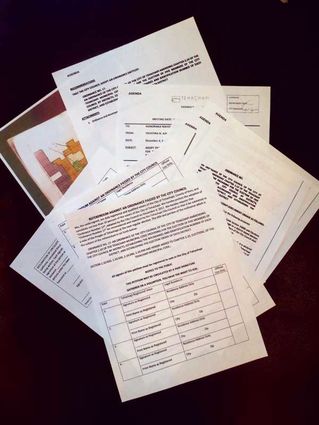PART 6 - Flaws doom district-based election petition
The Forde Files No 162

Tina Fisher Cunningham
Petition organizer Pete Graff provided his canvassers , or "circulators" with the above documentation, which included the City Council Dec. 4 agenda and staff report, a copy of the ordinance as presented on the Dec. 4 agenda on the city web site, the five-district "Purple" map that the City Council approved on Nov. 20 and forms on which the circulators declared he or she observed the signatures being written. Graff said that while he did much of the canvassing himself, he paid circulators $2 a signature for their time although the usual amount is $5. The practice is legal and is used statewide. On the agenda, the ordinance is referred to as "No. 17-" in the staff report and was left unnumbered on the copy of the measure. The number (17-07-745) was attached the day after the City Council's 5-0 vote to adopt the ordinance. The city said that the inaccurate ordinance number on the petition was one reason to reject it.
The city of Tehachapi has rejected a citizen's petition that would have required the City Council to rescind its Dec. 4 ordinance establishing district-based elections.
According to the city, mistakes in content and wording invalidated the signed forms that resident Peter Graff delivered to City Hall on Jan. 2, 2018. The forms bore 565 signatures, which were more than the ten percent of the city's registered voters (436) needed to validate the petition and trigger a referendum on the November ballot.
The city's outside legal counsel determined that the petition, as submitted, did not meet the state's Election Code requirements. The city declined to verify the signatures and returned the petitions to Graff.
"We are looking out for all the citizens of Tehachapi by following the rules as set forth," City Manager Greg Garrett said.
Undeterred, Graff planned to confront the City Council at its meeting on Feb. 5. He requested that the matter be placed on the agenda.
A Jan. 18 letter to Graff from Administrative Manager/Deputy City Clerk Ashley Whitmore, who is the city's elections officer, said the petition was missing the correct ordinance number and the supporting documentation that is required to be available to signers.
California Election code section 9238(b) referenced in Whitmore's letter says: "Each section of the referendum petition shall contain (1) the identifying number or title, and (2) the text of the ordinance or the portion of the ordinance that is the subject of the referendum."
Request reconsideration
Graff said he had followed the city's instructions on wording and procedure. He told Forde Files that he had briefed his team of canvassers and provided them with a packet that included copies of the Dec. 4 city staff report on the proposed ordinance, the City Council agenda for that meeting, the ordinance itself as presented on the agenda on the city web site and the five-district map as approved on Nov. 20 by the council.
The wording of the petition said "the undersigned protest the adoption" of the ordinance and they request that it be "reconsidered and repealed by the Tehachapi City Council or that it be submitted to a vote of the people of Tehachapi at the next regular election."
The wording on the petition included the ordinance title and reference to the affected municial code.
Graff's copy of the ordinance from the Dec. 4 agenda as posted in advance of the meeting on the city web site, however, did not include the final ordinance number. That number was assigned the day after the meeting.
"It's not numbered until it's approved," city Administrative Assistant Victoria Marsh told Forde Files.
The Dec. 4 City Council agenda copy of the ordinance showed a blank space after the title "Ordinance No." The staff report titled it Ordinance No. 17-, which is what Graff used in the petition.
The number attached to the ordinance the day after its approval was "17-07-745," which refers to the year of adoption, the number of the ordinance adopted that year and the total number of ordinances passed by the City Council through the years.
On Jan. 2, within the 30-day period the ordinance was subject to referendum, Graff delivered to City Hall the pages of signatures and the declarations of the circulators attesting that they had witnessed the signatures being written. The supporting documentation was not attached to each petition at that time; counsel concluded it should have been.
In the November 2018 general election, candidates will run in districts 1,4 and 5, to serve for four years, and in the general election of 2020, candidates will run in districts 2 and 3. At this time, the sitting council members live in the following districts: Phil Smith, 1; Dennis Wahlstrom, 4; Susan Wiggins, 5; Ken Hetge, 2; and Ed Grimes, 3.
Convert or face litigation
The City Council voted 5-0 to switch from the at-large election system, in which all voters in the city may vote for anyone on the ballot, to the district-based system, in which voters may cast ballots only for a candidate living in and representing their own districts. The council agreed to adopt the new system reluctantly and under threat of lawsuit and fear of financial catastrophe following the receipt of a letter from Malibu attorney Kevin Shenkman, who asserted that Tehachapi's at-large system is racially polarized and dilutes the rights of minority voters. His letter, in unkind terms, accused the city of historic racial bias.
There is no state law mandating that cities, school districts, water districts, community services districts and other jurisdictions convert to election districts, but the weight of precedent and amended provisions of the California Civil Rights Act (CVRA) make such conversion difficult to avoid. In a squishy yet consequential turn of phrase, the CVRA "disfavors" at-large voting. With no more effort than rudimentary data mining, Xeroxing a boilerplate letter and attaching a stamp, attorneys claiming to represent a minority plaintiff can send a letter to a jurisdiction threatening litigation and collect $30,000.00 for their trouble.
So far, all jurisdictions that have fought the imposition of district-based elections have lost in court. It cost Palmdale $4.5 million to lose its battle.
The city of Tehachapi has paid attorney Shenkman, who told Forde Files he wasn't sure he had ever been to Tehachapi.
See previous related stories by Tina Fisher Cunningham of the Forde Files in the Sept. 16, Sept. 30, Oct. 14, 2017 and Jan. 6, 2018 issues of The Loop Newspaper.




